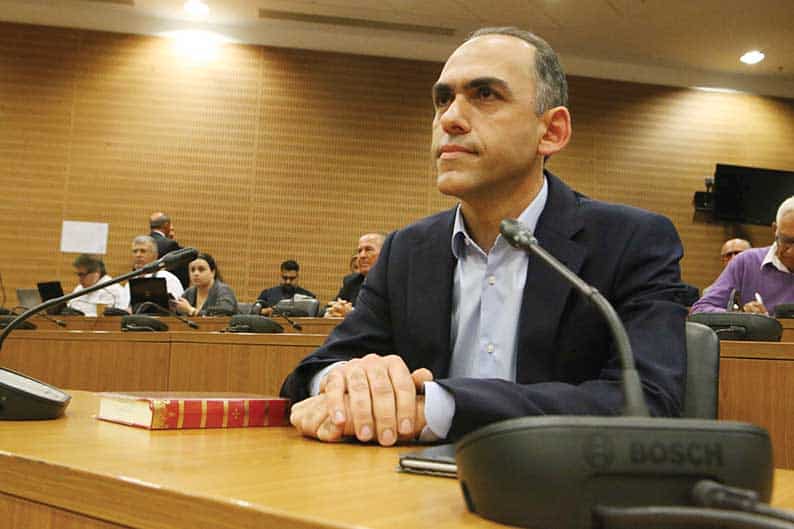
By Elias Hazou and George Psyllides
The government never expected to recuperate the money it invested in the ailing co-operative bank, Finance Minister Harris Georgiades bluntly told the panel investigating the lender’s demise.
Testifying before the committee on Thursday, the minister was asked whether he personally believed that, following its €1.5bn recapitalisation in 2013, the bank could becοme a viable operation.
Far from hiding that the co-op was a money sink, Georgiades said the government knew the lender could not be salvaged unless private investors were brought in.
“We were under no illusion that we’d get our money back, that we’d recover the money from the co-ops’ profits.”
He added: “Let us be specific about which organisation we are talking about. We never calculated, neither us nor the troika, that we would get our money back.”
At the same time, the minister gave cover to the successive boards at the co-op post-2013, saying they were faced with a gargantuan task.
Almost overnight, he said, the bank went from virtually non-existent corporate governance, before being nationalised, to being subject to the strictest regulatory regime.
“It’s like they [the boards] had to take a team from the lower divisions straight to the Champions League,” he remarked, using a football analogy.
“They started from zero.”
And he stressed that the state assistance granted to the co-op bank in 2013 was intended to avert a haircut on deposits.
The minister, heavily criticised following the co-op bank’s demise earlier this year, started his testimony by reading a prepared statement in which he said that nationalising the lender in 2013 by pumping €1.5bn initially and around €250m at a later stage, had been a political decision at EU level which President Nicos Anastasiades had secured.
Until that time, the co-op had a negative capital, he said.
“The question is not why and how the co-op came to a dead end in 2013. The question is how it managed to operate until 2013… how such an organisation was allowed to operate and handle people’s savings until 2013,” he said.
It was not even an organisation. Rather, it was a loose network of co-op banks that operated without credible procedures, supervision, and suitable staff, recklessly granting loans, even to its directors and nonexistent individuals, he said.
What was worse, was that no one bothered to check if those loans were serviced, he added.
“State aid in 2013 did not resolve the co-op’s problems. It prevented a haircut of deposits at the co-op bank also.”
The minister stuck to his guns regarding the government’s prior decision to float 25 per cent of the co-op’s shares to private investors, free of charge, on the stock exchange.
It was intended as a first step to privatising the bank.
The European Central Bank’s Single Supervisory Mechanism (SSM), as the regulator of the nationalized co-op, was skeptical of the move.
But Georgiades denied suggestions that the SSM’s stance forced the government to scrap its plan for the co-op.
The SSM has no legal say on the shareholding structure of a regulated bank. However, said Georgiades, the government did take into account the SSM’s strong opinions on the matter, and decided to ‘amend’ its plan.
The change involved bringing forward the call for private investors.
“In other words, phase 2 [finding a private investor] would be expedited. This is what [SSM chairwoman Daniele] Nouy asked us to do, that is, first we line up the strategic investors and only then do we list the co-op on the stock exchange.”
Back in September, Nouy herself had been expected to testify before the committee. But she declined a summons, citing the immunity afforded her by the European Central Bank.
Georgiades also fended off allegations that, once the co-op had been nationalised, the state was negligent in monitoring the bank’s expenses.
Day-to-day inflows and outflows were the responsibility of the bank’s management, he offered.
While acknowledging that the co-op was plagued by non-performing loans (NPLs), Georgiades insisted it was not the chief cause of the bank’s collapse.
From 2014 to the end of 2017, NPLs on the bank’s books had shrunk by 15 per cent, compared to an average 25 per cent decrease in the entire banking system.
“Is it that the other banks were on a better trajectory, that the co-op was lagging behind [in reducing NPLs]? No, this was not the reason.
“The reason that necessitated more drastic measures at the co-op, compared to other banks which had even higher ratios of NPLs, has to do with the fact that, contrary to the other banks I have mentioned, the Cyprus Cooperative Bank had no shareholders; there was no shareholder who was allowed to inject a single euro into it.”
The post Georgiades asks how co-op was allowed to operate the way it did up to 2013 appeared first on Cyprus Mail.